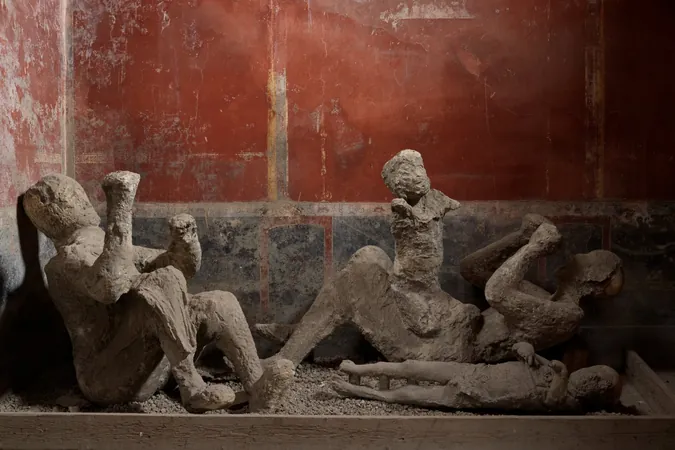
Unbelievable DNA Discoveries in Pompeii: A New Perspective on Ancient Lives!
2024-11-07
Author: Ken Lee
In a groundbreaking revelation, researchers have unlocked new insights into the lives of some of the victims who perished in the catastrophic eruption of Mount Vesuvius in 79 AD. A recent DNA analysis conducted on remains from Pompeii has debunked long-held beliefs about the relationships and identities of these individuals.
Published in the journal Current Biology, this study sheds light on the significant genetic diversity of Pompeii’s residents, indicating connections far beyond the expectations of ancient Rome's demographics. “Our findings reveal that the Eastern Mediterranean's genetic influences extended beyond major urban centers like Rome, showcasing the cosmopolitan makeup of Pompeii,” stated Alissa Mittnik, an archaeogeneticist at the Max Planck Institute for Evolutionary Anthropology and Harvard University.
Historically buried under layers of ash and debris, Pompeii and its sister city Herculaneum were nearly frozen in time due to the eruption. Preservation efforts have allowed archaeologists to reconstruct not only the city’s infrastructure but also its rich cultural tapestry. Remarkably, even after centuries of decomposition, DNA can still be extracted from the skeletal remains buried deep beneath the volcanic ash.
The research team focused on 14 plaster casts from the 86 currently being restored, where they uncovered significant discrepancies in the gender and familial relationships of the remains. Notably, what was previously thought to be the remains of a mother and child has now been identified as an unrelated adult male and a child. Similarly, two supposed sisters discovered together included at least one male, suggesting a broader and more complex social dynamic than earlier interpretations indicated.
“This study highlights the pitfalls of narratives based solely on limited evidence,” remarked David Caramelli, a researcher at the Universita di Firenze. “We've often overlooked how the context of discovery affected storytelling about these victims, leading to misconceptions.”
The research reinforces findings from past genetic studies that revealed connections between Pompeians and communities across the Mediterranean. A 2022 study had already established links to individuals with Sardinian ancestry. Interestingly, the latest research indicates that five of the studied individuals were genetically closer to ancient groups from the Levant and North African Jewish populations than to contemporary Italians or Etruscans.
As Pompeii served as a crucial port during the Roman Empire, it became a melting pot of various cultures and ethnicities. With ongoing advancements in ancient DNA analysis, researchers are encouraged by the potential to rethink and refine our understanding of the lives that were abruptly cut short during this historic disaster.
Experts have emphasized the importance of integrating genetic findings with bioarchaeological data to create a more nuanced picture of Pompeii’s diverse population. Gabriele Scorrano, a geneticist at the University of Rome Tor Vergata, stated, “Finding genetic evidence amid the remnants of Pompeii allows us to correct flawed narratives created by previous restorations.”
This new research not only illuminates the stories of the past but also challenges preconceived notions about the individuals who lived in this ancient port city. As investigations continue, they promise to reveal more about the complex tapestry that was Pompeii, helping us understand the many lives caught in the tragic eruption of Vesuvius—a stark reminder of how one cataclysmic event forever changed the course of history. Stay tuned as we uncover more secrets hidden in the ashes!


 Brasil (PT)
Brasil (PT)
 Canada (EN)
Canada (EN)
 Chile (ES)
Chile (ES)
 España (ES)
España (ES)
 France (FR)
France (FR)
 Hong Kong (EN)
Hong Kong (EN)
 Italia (IT)
Italia (IT)
 日本 (JA)
日本 (JA)
 Magyarország (HU)
Magyarország (HU)
 Norge (NO)
Norge (NO)
 Polska (PL)
Polska (PL)
 Schweiz (DE)
Schweiz (DE)
 Singapore (EN)
Singapore (EN)
 Sverige (SV)
Sverige (SV)
 Suomi (FI)
Suomi (FI)
 Türkiye (TR)
Türkiye (TR)